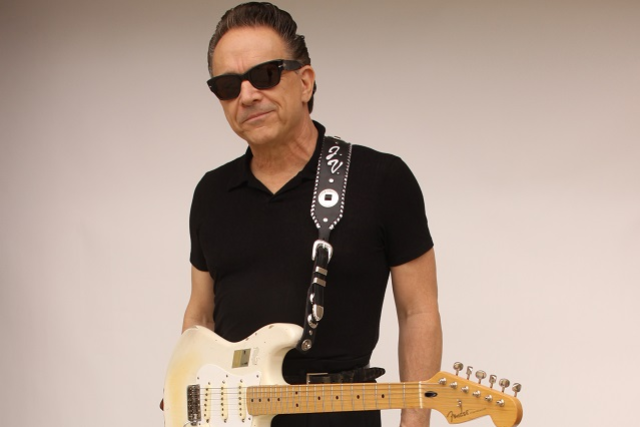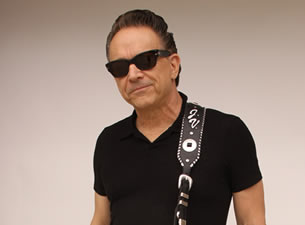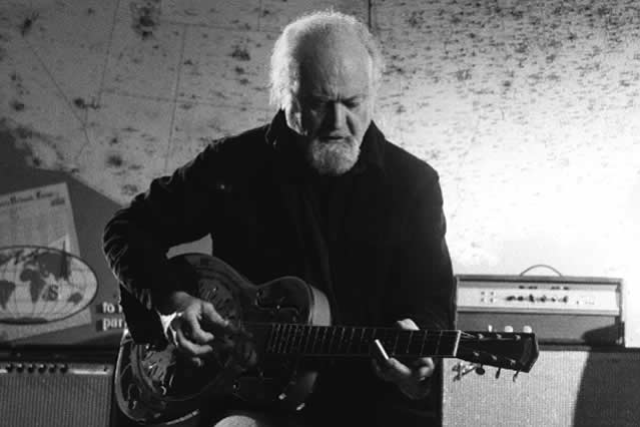
Jimmie Vaughan

When it comes to the blues today, there are a handful of guiding lights to make sure the music stays true to its powerful source. The sound of pleasure and pain that first sparked musicians to create such a sound is a force that can never be underestimated. The mojo has to be there. For Jimmie Vaughan, he's dedicated his life to making sure the blues not only stays alive, but remains full of life and an inspiration to all who listen. It's a spirit he holds close to him, and for over 50 years of holding the blues close inside him, Vaughan isn't about to stop now.
Jimmie Vaughan's new album, BABY, PLEASE COME HOME, is a rolling and righteous celebration of everything the blues can be. The songs can go up, down, sideways and even off in their own distinctive direction, but one thing is certain, each and every one of them is packed with pure feeling and striking originality. That's because while the blues is almost as old as America itself, every time a musician lends their soul to living inside these songs, something new comes out. There is a constant reinvention for musicians like Vaughan, because the blues demands it. There can be nothing less than a revelation, because that's how the music stays alive. It is almost like an alchemy exists, where instruments and voice join together to make a joyful noise. And above all else the blues, in the capable of hands of Vaughan and his musical cohorts, is a path to salvation. One that is birthed in the ability of songs to make life on earth a better place to be.
Sometimes it takes decades to finally arrive at a place called home. When a young player starts out as a teenager to find a spot to call his own, there can be enough twists and turns to throw even the most dedicated of souls off the mark. Life can be a tricky endeavor, and between the bright lights and the dark nights, that road ahead can be full of false starts and deceiving roadblocks. But on BABY, PLEASE COME HOME Jimmie Vaughan proves without doubt all his efforts and energy have taken him to the promised land. Maybe that's because blues is really the art of distillation, seeking the sound where there are no extraneous notes, or unnecessary additions to the feeling of freedom. It takes years to get there, and patience is most definitely a virtue. Above all else, feeling is the most important element of all. With that, all else can be conquered.
"Playing what you feel has always been my main goal," Vaughan says. Considering the Texas guitarist and singer has had the kind of career that makes him a living legacy, those are no idle words. His first group when he was starting high school played Dallas' Hob Knob Lounge six nights a week, learning the kind of lessons that can't be taught. They have to be lived. Other bands in the '60s convinced the young man it was time to find a way to play the music he felt the strongest about: the blues, That took him to hitchhiking to Austin in the early '70s and carving out a new crew of blues players who shared his musical excitement. Jimmie Vaughan started in the lead, and has remained there. After worldwide success with the Fabulous Thunderbirds during the '80s, it came time to leave that band and build his own path in exploring different approaches to the blues. He did not hesitate. And what Vaughan discovered was that he could take it anywhere; there were no boundaries. "I wanted to find out what I could really do," he says, "and when I started singing it gave me a whole new side to explore. When I was young I didn't really pay much attention to categories of music. I just heard what I liked and decided to explore that. And that's really what I'm still doing."
For the past few years, Jimmie Vaughan has been recording a series of albums dedicated to the songs he's always held in high esteem, recorded by artists that inspired him from his very earliest days of performing. The sessions have been held in studios near Austin, and he was surrounded by fellow musicians who understand that music is intended to ignite the heart and fill the soul. There can be no shortcuts or sleight-of-hand when playing these songs. They come from writers and performers who responsible for so much of modern popular musics, some well known but many are other who are still names not known outside the blues world. On BABY, PLEASE COME HOME, some of those original artists are Lloyd Price, Jimmy Donley, Lefty Frizell, Richard Berry, Chuck Willis, Bill Doggett, T-Bone Walker, Etta James, Fats Domino, Gatemouth Brown and Jimmy Reed. In so many ways, this is a list of some of the prime purveyors of America's greatest music. That it can range from seminal bluesmen like Jimmy Reed to one of the founding father of modern country music Lefty Frizell proves the point that Vaughan has always believed: music is not about what it is labeled, but rather how it makes the listener feel. On BABY, PLEASE COME HOME, those feelings are played to the hilt by some of Jimmie Vaughan's long-standing A-team, including George Rains, Billy Pitman, Ronnie James, Mike Flanigan, Doug James, Greg Piccolo, Al Gomez, Kaz Kazonoff, T. Jarred Bonata, John Mills and Randy Zimmerman. They are joined by guest vocalists Georgia Bramhall and Emily Gimble.
These sessions, mostly held at San Marcos, Texas' Fire Station studio, were the kind of recordings that are based on musicians who have been playing this music for decades. They've come to have a near-silent style of communication, where a look or a smile communicates much more than words ever could. As bandleader, singer and guitarist, Jimmie Vaughan is a master of how everything is captured for posterity. His singing voice has grown into a study in strength. And while sometimes he might say, "Sometimes you can sing and sometimes you can't," like everything else the Texan touches, Vaughan knows when it's right and never stops until it is. He has always looked to his soul as the ultimate barometer of when the music is right, and when that is satisfied Vaughan knows he has found that spot where the music is ready to be shared.
The Rolling Stones' Keith Richards once said, "The blues. It's probably the most important thing America has ever given the world." To which Jimmie Vaughan would likely add, "Amen."

"Incendiary...Scalding guitar and banshee solos. Ellis mixes soul and fire." –Premier Guitar
"Rugged, burning and riveting...Tinsley Ellis is a powerful and commanding presence, both on guitar and as a gruff, full-throated vocalist. He’s the hardest-working man in blues-rock...It’s impossible to not enjoy the ride." –Blues Music Magazine
Ever since he first hit the road 40 years ago, blues-rock guitar virtuoso, soulful vocalist and prolific songwriter Tinsley Ellis has grown his worldwide audience one scorching performance at a time. Armed with blazing, every-note-matters guitar skills and scores of instantly memorable original songs, Ellis has traveled enough miles, he says, “to get to the moon and back six times.” He’s released 17 previous solo albums, and has earned his place at the top of the blues-rock world. When asked if he’d consider himself a “blue-collar” bluesman, Ellis, in his trademark wit, quips, “No. I’m part of the no-collar crowd.” His imaginative songs tell stories of common, shared experiences in uncommon ways, all fueled by his high-octane, infectious, hard-rocking guitar playing. Live, Ellis has captivated and amazed fans in all 50 United States, as well as in Canada, all across Europe, Australia and South America. Vintage Guitar says, “He delivers blistering blues-rock, soul romps, minor-key blues, and shuffles—and it all sounds great.” The Chicago Sun-Times says, “It’s hard to overstate the raw power of his music.”
Ellis considers his new album, Ice Cream In Hell, the most raw-sounding, guitar-drenched album of his career. Recorded in Nashville and produced by Ellis and his longtime co-producer Kevin McKendree (John Hiatt, Delbert McClinton), Ice Cream In Hell is a cathartic blast of blues-rock power. Though inspired by all three Kings (B.B., Albert and Freddie), as well by Carlos Santana, Hound Dog Taylor and others, Ice Cream In Hell is pure, unadulterated Tinsley Ellis. The 11 Ellis originals range from the nod to Stax-era Albert King, Last One To Know, to the Peter Green-flavored Everything And Everyone to the Hound Dog Taylor-esqe romp Sit Tight Mama before ending with the hair-raising, slow-burning ballad, Your Love’s Like Heroin. Throughout the album, Ellis’ deeply emotional, lyrical guitar solos perfectly match his fervent vocals.
On Ice Cream In Hell, says Ellis, “there’s more guitar than ever.” His main axe during recording was his cherry red Freddie King ES-345 reissue. One of only 200 made in 2018, it instantly became Elllis’ go-to guitar. In addition, he used his 1959 Fender Stratocaster, 1967 Gibson ES-345, 1973 Gibson Les Paul Deluxe, 1983 Gibson Moderne and his 1969 Martin D-35. Rolling Stone says Ellis plays “feral blues guitar...non-stop gigging has sharpened his six-string to a razor’s edge...his eloquence dazzles...he achieves pyrotechnics that rival early Jeff Beck and Eric Clapton.”
In addition to his legions of fans, Ellis is also revered by his fellow guitarists, with famous friends including Derek Trucks, Warren Haynes, Oliver Wood, Jonny Lang, Buddy Guy, the Tedeschi Trucks Band, Gov’t Mule, and members of Widespread Panic calling on him to sit in and jam. He’s recently toured with Alligator label mates Tommy Castro and Coco Montoya. Additionally, Ellis shared stages with late blues legends including Stevie Ray Vaughan, Otis Rush, Willie Dixon, Leon Russell, Son Seals, Koko Taylor, Albert Collins and many others. But no matter where or with whom he performs, Ellis always plays with grit, soul and unbridled passion.
Born in Atlanta in 1957, Ellis was raised in southern Florida. He acquired his first guitar at age seven, soon after seeing The Beatles perform on the Ed Sullivan Show. He took to it instantly, developing and sharpening his skills as he grew up. Ellis discovered the blues through the back door of British Invasion bands like The Yardbirds, The Animals, Cream and The Rolling Stones as well as Southern rockers like The Allman Brothers. One night in 1972, he and a friend were listening to Al Kooper and Michael Bloomfield’s Super Session record when his friend’s older brother told them if they liked that, they should really go see B.B. King, who was in town that week.
Tinsley and his friends went to the Saturday afternoon performance, sitting transfixed in the front row. When B.B. broke a string on his guitar, Lucille, he changed it without missing a beat, and handed the broken string to Ellis. After the show, B.B. came out and talked with fans, mesmerizing Tinsley with his warmth and kindness. Tinsley’s fate was now sealed; he had to become a blues guitarist. He saw Howlin’ Wolf, Muddy Waters and every other blues artist who came through town, always sitting up front, always waiting to meet the artists, take photos, and get autographs. To this day, he still has B.B.’s string.
Less than three years later, Ellis, already an accomplished teenaged musician, left Florida and moved to Atlanta. He soon joined a hard-driving local blues band, the Alley Cats. In 1981, along with veteran blues singer and harpist Chicago Bob Nelson, Tinsley formed The Heartfixers, a group that would become Atlanta’s top-drawing blues band. After cutting a few Heartfixers albums for the Landslide label, Ellis was ready to head out on his own.
Georgia Blue, Tinsley’s first Alligator release, hit the unprepared public by surprise in 1988. The Chicago Tribune said, “Tinsley Ellis torches with molten fretwork. Ellis takes classic, Southern blues-rock workouts and jolts them to new life with a torrid ax barrage.” His next four releases—1989’s Fanning The Flames, 1992’s Trouble Time, 1994’s Storm Warning (his song A Quitter Never Wins, a highlight from Storm Warning, was recorded by Jonny Lang, selling almost two million copies), and 1997’s Fire It Up—further grew his legend as well as his audience. Features and reviews ran in Rolling Stone, The Chicago Tribune, The Washington Post, The Los Angeles Times, The Boston Globe, and in many other national and regional publications.
In the early 2000s, Ellis released albums on Capricorn Records and on Telarc before returning to Alligator in 2005 with Live–Highwayman, which captured the fifth-gear energy of his barn-burning live show. He followed it with two more incendiary studio releases, 2007’s Moment Of Truth and 2009’s Speak No Evil. He self-released four successful albums on his own Heartfixer label before coming back home to Alligator in 2018, releasing the fan favorite Winning Hand. The album debuted at #1 on the Billboard Blues Chart and earned a Blues Music Award (BMA) nomination for Album Of The Year. Ellis was simultaneously nominated for a BMA for Blues Rock Artist Of The Year and for a Living Blues Readers Award for Blues Artist Of The Year. Atlanta’s Stomp & Stammer magazine went all in, saying, “Tinsley Ellis is Georgia’s finest blues picker. Ellis tells great stories through well-written lyrics and heavy doses of guitar virtuosity. He captures a level of authenticity that should inspire more than just his fellow blues players. Americana artists and garage rockers could learn a thing or two from these songs.”
Over the course of his career, Ellis has featured a number of guests on his solo albums. He's recorded with Peter Buck (R.E.M.), guitarist Derek Trucks (who, at age 14, made his recording debut with Tinsley) and keyboardist Chuck Leavell (The Rolling Stones). He in turn has made guest appearances on albums by The Allman Brothers, Gov’t Mule, Colonel Bruce Hampton and others. Producers Eddy Offord (John Lennon, Yoko Ono, Yes) and even the legendary Tom Dowd (The Allman Brothers, Ray Charles) helped Ellis hone his studio sound.
“A musician never got famous staying home,” says Ellis, who continues to perform over 150 nights a year. Now, with Ice Cream In Hell, Tinsley Ellis will again hit the highway, bringing his roof-raising, road-tested music to fans wherever they may be. “I’ve seen it all,” the Atlanta native says of his four decades on the road. “And a lot of my audience has been along for the entire time. It’s not always easy. But the payoff is the music. That’s the ice cream.”